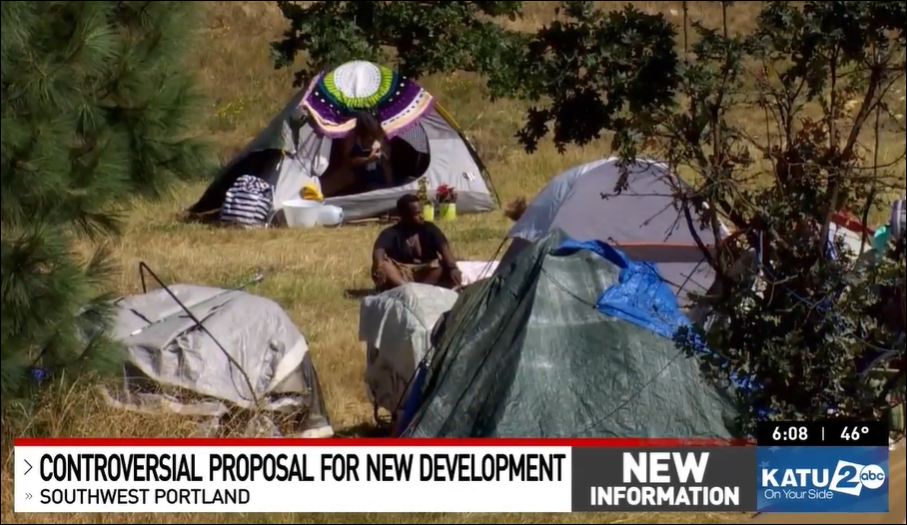Members of Portland, Oregon’s Planning and Sustainability Commission want property owners besieged by homeless vagrants to “provide opportunities to rest and be welcome.”
 What that means isn’t exactly clear.
What that means isn’t exactly clear.
“Just one of the realities of Portland right now is that we have a lot of folks who are unhoused who benefit from some of these spaces that provide weather protection,” Commissioner Oriana Magnera said at a meeting last month.
Magnera talked about “some spaces with overhangs where someone could pitch a tent or rest longer term.”
On Nov. 12, the commission narrowly approved new language for the city’s design review process that would require developments “provide opportunities to rest and be welcome,” despite concerns from some about the vague phrasing, KATU reports.
“What does it mean to rest?” commission Chairwoman Katherine Schultz questioned. “Am I providing a place to sleep?”
Commissioner Jeff Bachrach, an attorney, said he’s “concerned this is going to become quite controversial.”
“I think for us to put into design review some loaded words that suggest we want some design commissioners to think about people resting for hours, pitching tents, I think we’re just putting too great of a burden on design review,” he said.
Bachrach was one of four commissioners, along with Schultz, Ben Bortolazzo, a designer at Otak, and Mike Houch, a naturalist with Urban Greenspaces Institute, who voted against the language, which was ultimately approved 5-4.
Bachrach argued the idea just doesn’t make sense, the Willamette Week reports.
“We don’t have any policy in this city – whether it’s for public parks or quasi-public open spaces – that says we want homeless people sleeping outside and pitching tents,” he said. “To the contrary, we are building more shelters and discouraging tents.”
The city defines the “design guidelines” as “mandatory approval criteria that must be met as part of design review.”
This is visionary! Yes to designing policies that center people who are poor, rather than always bolstering wealth. After all 📢 @multco reports that 34% of residents don’t have enough 💵to meet basic needs. The future city should be for them. 🌅@Verde_NW https://t.co/yGmFlbODIj
— Kaia Sand (@mkaiasand) December 5, 2019
Kaia Sand, executive director of Street Roots, a local homeless newspaper, described the change as “visionary!”
“Yes to designing policies that center people who are poor, rather than always bolstering wealth. After all @multco reports that 34% of residents don’t have enough (money emoji) to meet basic needs. The future city should be for them,” Sand posted to Twitter.
Other locals who spoke to KATU offered a different take.
“It sounds kind of iffy to me,” resident Douglas Estudillo said, “to require developers to supply a space to homeless. I’m not sure that’s necessarily their job.
“That’s our job as a community,” he said.
None of the commissioners would discuss the proposal with the news site, but Schultz provided a prepared statement that offers little insight into how the new policy will actually play out.
“The discussion around ‘Guidline 6: Provide opportunities to rest and be welcome’ was one of the most robust of the Planning and Sustainability Commission’s November 12 work session on the Design Overlay Zone Amendments (DOZA) project. Commissioners discussed how private development can provide places for people to feel welcome and safe, as well as allow space for people to rest, especially in light of our current housing shortage,” the statement read.
“The Commission will talk about his further at our next work session and will provide suggested language to the Design Commission that helps clarify the intent of the word ‘rest.’ The Design Commission is the recommending body to City Council for proposed new design guidelines,” the statement continued.
“The City design review program and guidelines that are the subject of DOZA affect the design of new buildings but do not control the use of properties.”
The City of Portland forwarded a statement from the commission when contacted by KATU.
“The definition of ‘rest’ was quite involved. We think the background should address this more fully and clarify the intent of the word,” the statement read. “The PSC will talk about this further at its (Dec. 17) work session and will provide suggested language to the Design Commission after our discussion.”

Leave a Comment
COMMENTS POLICY: We have no tolerance for messages of violence, racism, vulgarity, obscenity or other such discourteous behavior. Thank you for contributing to a respectful and useful online dialogue.